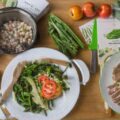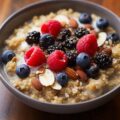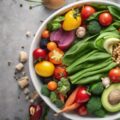Dealing with inflammation can be challenging, but your diet plays a critical role in managing it. An anti-inflammatory meal plan can help reduce inflammation and promote overall health. In this article, we’ll explore a 7-day anti-inflammatory meal plan that is not only delicious but also beneficial for your health.
Understanding Inflammation
Inflammation is the body’s natural response to protect itself against harm. However, chronic inflammation can lead to various health issues, including heart disease, diabetes, and arthritis. This is why incorporating anti-inflammatory foods into your diet is essential.
Day 1: Kickstart Your Morning
- Breakfast: Oatmeal with mixed berries and chia seeds
- Lunch: Grilled chicken salad with mixed greens and olive oil dressing
- Dinner: Baked salmon with steamed broccoli and quinoa
Day 2: Flavorful and Filling
- Breakfast: Avocado toast with poached eggs
- Lunch: Lentil soup with spinach and whole-grain bread
- Dinner: Stir-fried tofu with bell peppers and brown rice
Day 3: Plant-Powered Nutrition
- Breakfast: Green smoothie with spinach, banana, and almond butter
- Lunch: Quinoa salad with chickpeas, cucumber, and feta cheese
- Dinner: Grilled vegetable kebabs with a side of couscous
Day 4: Heart-Healthy Fats
- Breakfast: Chia seed pudding with nuts and coconut flakes
- Lunch: Turkey wrap with avocado and mixed greens
- Dinner: Grilled mackerel with a side of sweet potato mash
Day 5: Anti-Inflammatory Spices
- Breakfast: Turmeric-infused scrambled eggs with whole-grain toast
- Lunch: Moroccan chickpea stew with brown rice
- Dinner: Chicken curry with mixed vegetables and basmati rice
Day 6 and 7: Diversity in Diet
Continue incorporating a variety of anti-inflammatory foods into your meals, focusing on whole grains, lean proteins, and plenty of fruits and vegetables. Experiment with herbs and spices to add flavor without the need for excess salt or sugar.
FAQ
What makes a diet anti-inflammatory?
An anti-inflammatory diet includes foods that are rich in antioxidants, healthy fats, and fiber. It aims to reduce inflammation by focusing on whole, nutrient-dense foods while minimizing processed foods and sugars.
Can this meal plan help with weight loss?
While the primary focus is on reducing inflammation, this meal plan can also contribute to weight loss due to its emphasis on whole foods and balanced nutrition.
Is this meal plan suitable for vegetarians?
Yes, with the substitution of plant-based protein sources, this meal plan can be easily adapted for vegetarians.
How can I ensure variety in my anti-inflammatory diet?
Incorporate a wide range of fruits, vegetables, whole grains, and protein sources to ensure you’re getting a variety of nutrients and to keep your meals interesting.
Are there any foods I should avoid on an anti-inflammatory diet?
It’s best to avoid processed foods, red meat, sugary drinks, and excessive alcohol, as these can increase inflammation in the body.









